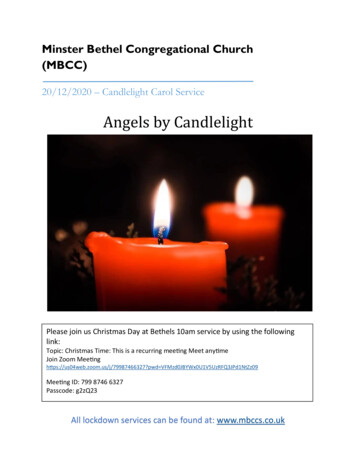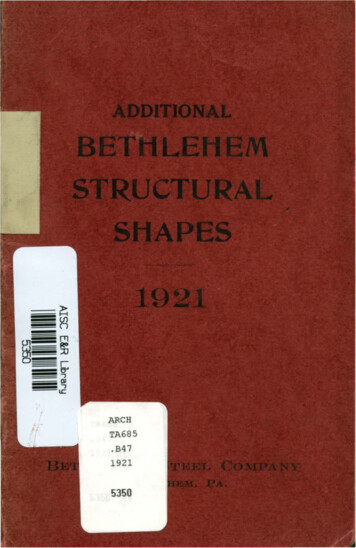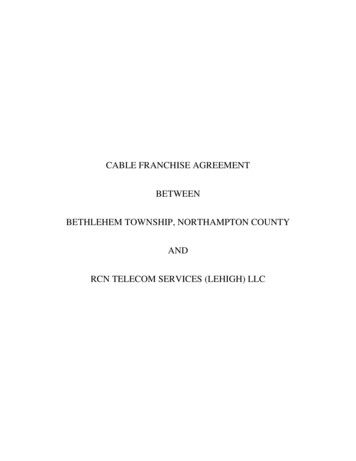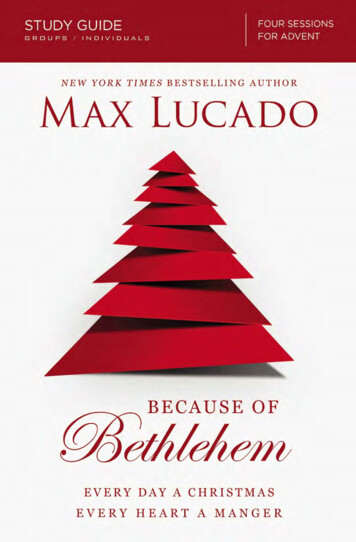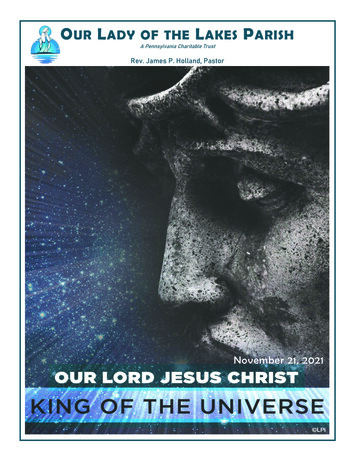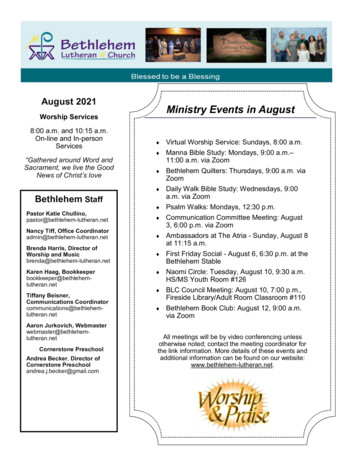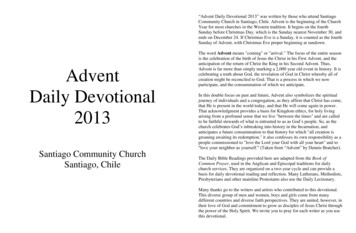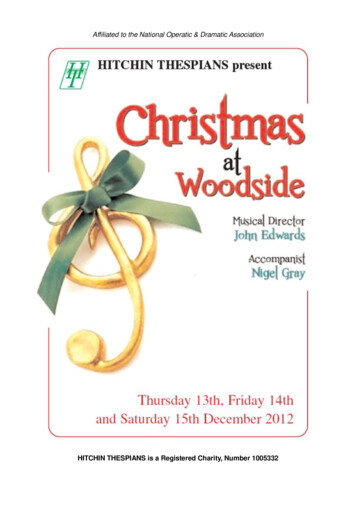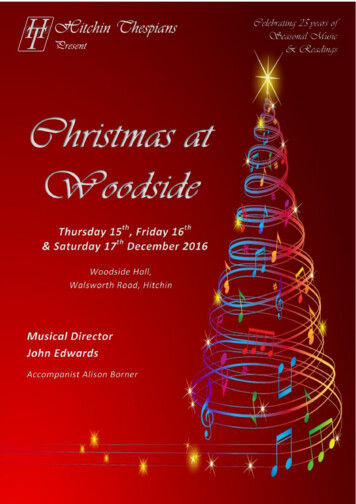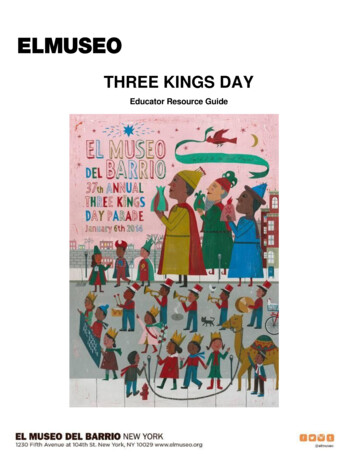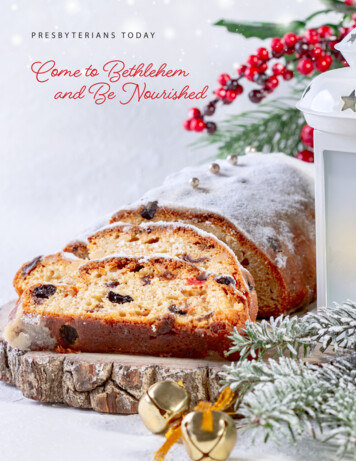
Transcription
P R E S BY T E R I A N S TO DAYCome to Bethlehemand Be Nourished
INTRODUCTIONCome to Bethlehem and Be NourishedAdvent’s Hunger Gives Way to Christmas’ FulfillmentBy Donna Frischknecht Jackson, Editor of Presbyterians TodayIwas hopeful at the start of 2021. Vaccines fora global pandemic were available. Businessesand churches began reopening. Weddingsthat were put on hold resumed. As the monthspassed, though, hope began to wane. Coronavirus variants emerged. Debates on mask wearingescalated. Those tirelessly working for justicegrew weary. I found myself searching for certainty in a still uncertain world. And now, as theyear ends and the Advent season begins, I findmyself, like my biblical forebears, walking indarkness. Perhaps you are walking with me, too.Now more than ever, we need to hold on tothe Advent truth Isaiah proclaimed that “thosewho lived in a land of deep darkness — on themlight has shined.” And we hold on to that promise together — in a community rooted in prayerand marked with compassion and forgiveness.We cannot walk alone. Nor should we.We need to find our strength in the GoodNews of that holy night when a Savior for allhumankind came to save us. We need to helpone another bolster an all too precarious faith,especially in a world that seems to be emergingfrom a global crisis no better than it was before.Tempers are rising, patience is shorter, andself-preservation seems to be the star guidingbusinesses, governments and churches.During this Advent, what if we seek to be thebuilders of that peaceable kingdom foretold,2Presbyterians Today 2021 Advent & Christmas Devotional Introductionboldly committing to build a communitythat cares for the unloved, the unseen and theunheard? What if we discover once again that allwe hunger for is in that ancient feeding troughthat cradled a precious gift — a babe who wouldone day say, “I am the Bread of Life.”Hearth, home and a loaf of breadBread is a key theme for this year’s onlinedevotional, which will continue beyond the fourweeks of Advent through the 12 Days of Christmas and end on Epiphany, Jan. 6.The inspiration for this devotional came froman experience I had just before the pandemic uprooted our lives. For three days, I livedin a community without running water andelectricity, mastering the skills of 18th-centuryopen-hearth cooking. I slept on a rope bed witha straw mattress. I washed my face with a bucketof cold creek water. And I baked to feed not
only myself, but the many others who were onthe same colonial campus participating in otherprimitive life skills classes.I didn’t just learn how to make bread in avariety of ways: in a Dutch oven over glowingcoals, in an outdoor clay beehive oven and in abread oven in an old stone fireplace. I was struckwith a profound awareness that I should nevertake for granted my daily bread.This experience revealed how I needed thehelp of others to make one loaf of bread evenpossible. It took many hands to cut wood for thefires, to stoke the embers, to mill the grain forflour, to knead the dough, to wash the pots, toset the table and to offer grace. (Perhaps you canguess which task I gladly took on.)When I returned to running water andelectricity, I didn’t leave behind what I learnedduring those three days. I carried the experiencewith me, especially throughout the pandemic,as I found myself wondering what communitybuilding lessons from the past can strengthenour weakened communities of the present.Howard Thurman joins usLike Presbyterians Today’s 2020 Advent andChristmas devotional based on Howard Thurman’s “I Will Light Candles This Christmas,”we will once again be warmed by the wisdomof Howard Thurman. Each week we will reflecton a verse of his lesser known reflection, “TheSacrament of Christmas.”Thurman — an African American theologian, preacher and activist known for his deepspirituality — viewed the seasons of Advent andChristmas not only sacramentally, but as a timefor taking stock of and adjusting our lives. I believe the 2021 Advent and Christmas seasons areasking us to do exactly what Thurman observed:It is time to take stock of and make adjustmentsin our lives so that we, the body of Christ, canbe loving and relevant in the world.Daily morsels of hopeAs Thurman’s wisdom feeds us, we will alsobreak open God’s Word, with daily Scriptureverses to ponder, followed by a reflection andprayer. We will journey to Bethlehem, which inHebrew means “House of Bread” and in Aramaic means “House of Meat.” We will also makebread and share those loaves with others. Wewill discover how the placing of our newbornSavior in an animal’s feeding trough, becausethere was no bed available for him, was symbolicof how — in him — all our Advent hungerswould indeed turn into Christmas joys.If you are entering this holy time weary andworried, you are not alone. I am there with you.Let us go to the House of Bread. Let us read,listen and share. Let us light the candles aroundthe Advent wreath. Let us bake bread. Let usshare those loaves with others.Let us find hope again — together.An interactive Advent and Christmas devotionalBread making as a spiritual practiceThis year’s devotional invites you to be part ofbuilding a tighter-knit community right whereyou are. Share the devotional with friends andfamily. Read and reflect together as a smallgroup meeting over Zoom or in person. Youare also encouraged to bake bread and share theloaves as gifts with others.Each Friday in Advent, a bread recipe will beoffered. Make more than one loaf so that youcan share one and keep the other to be part ofyour Sunday Advent practice of having a simplemeal as you light the candles around the Adventwreath.You can enjoy the bread as you light theAdvent candles as part of your breakfast or laterin the day for supper. For either meal, keep itsimple: bread, butter and jam for breakfast;bread and soup for dinner. Advent was originallyembraced as a winter Lent, so having simplemeals during a season of holiday feasting willmake a wonderful spiritual practice.And for those whose baking skills are notthe best — or if there is a week where there isno time to mix, knead and bake — seek outartisan bread in your neighborhood bakeries orspecialty shops. Buy a loaf for yourself and a loafto give away. The local shops will appreciate thebusiness.Social media participationPresbyterians Today wants to share your loavesof bread or your lighted Advent candles (orboth together) with others. Submit pictures toDonna Frischknecht Jackson at editor@pcusa.org. Please include your name, church and abrief description of and/or reflection about thepicture.Presbyterians Today 2021 Advent & Christmas Devotional Introduction3
WEEK 1An Act of FaithThe Sacrament of ChristmasBY H O WA R D T H U R MA NI make an act of faith toward all humankind, I make an act of trust toward all life,Where doubts would linger and suspicionsWhere fears preside and distrusts keep watch.brood.I make an act of love toward friend and foe,I make an act of joy toward all sad hearts,Where trust is weak and hate burns bright.Where laughter pales and tears abound.I make a deed to God of all my days –I make an act of strength toward feeble things, And look out on life with quiet eyes.Where life grows dim and death draws near.ReflectPrayAs Advent begins, consider the acts of faith Godis asking you to show the world. How can youract of faith dispel doubts and put an end to divisiveness that seems to be abundant these days?Gracious God, just as the disciples asked for theirfaith to increase, we too come to you at the start ofthis holy season asking for more faith. You knowwhere our faith wavers. Come to us, now, so thatwe can be bold in our witness and ease the unrest ofa distrustful world. In Jesus’ name, we pray. Amen.Amish Friendship BreadWe begin the Advent “House of Bread”journey with a recipe for Amish FriendshipBread. It is called “friendship” bread and ithas been described as the “chain letter” ofbread making because it uses a sourdoughstarter that is made in advance and sharedwith friends to make their own bread.You can begin this bread at the start ofAdvent, allowing the time needed for thesourdough starter. When the starter mixis ready, share it with others and makeloaves for gift giving. To get started, go adSo that you have a loaf of bread readyfor the first Sunday of Advent, either makeyour favorite quick loaf recipe, buy a loafat the store or get a boxed mix to whipup. (No judgment here.) As the weeks ofAdvent continue, remember: A new recipewill be posted each Friday, allowing youtime to bake on Saturday and have breadfor a Sunday meal around the Adventwreath.4Presbyterians Today 2021 Advent & Christmas Devotional Week 1Day 1 First Sunday of Advent, Nov. 28The four-candle room chargeThe days are surely coming, says the Lord, whenI will fulfill the promise I made to the house ofIsrael and the house of Judah. In those days and atthat time I will cause a righteous Branch to springup for David; and he shall execute justice andrighteousness in the land. In those days Judah willbe saved and Jerusalem will live in safety. And thisis the name by which it will be called: “The Lord isour righteousness.” — Jeremiah 33:14–16I began settling into what would be my homefor the next three days — a clapboard-sided andwood-shingled roof structure from the 1700sthat once served as a tavern for hungry and tiredtravelers. After putting my quilt on top of thestraw mattress in one of the tiny bedrooms onthe second floor, I took from my bag four candles. The candles were my payment for choosingto sleep in the tavern rather than a nearby motelduring the open-hearth cooking class I signedup for.Down the narrow stairs and into the kitchenI went. A fire was already blazing in the massivehearth. The cooking instructor was kneeling in
front of a skillet that was placed over hot coals. Ipeeked over his shoulder and noticed golden biscuits that made my mouth water. “Biscuits madein a skillet?” I asked. “I had no idea you coulddo that.” He chuckled and looked up. Noticingthe candles in my hand, he nodded to a woodenbox in the corner. “You can put them there,” hesaid. I made my way to the box and opened thelid. Inside were hundreds of candles: some withwicks untouched and some burned down to aninch. I placed my candles as if placing moneyin an offering plate — with reverence and asense that they would now be part of somethingbigger.I sat by the fire, took a biscuit and askedabout the curious four-candle room charge. Legend has it that a woman found her retreat intoa world without modern-day conveniences sohealing that she wanted to thank the founder ofthis living-history campus. What could she giveto show what her stay meant to her? That’s whenshe thought of four candles. She sent the candleswith a note that explained they representedthe ones she would light during Advent: hope,peace, joy and love.“She experienced the real meaning of Adventhere in this old tavern,” the instructor said, nottaking his eyes off the second batch of biscuitsthat he had begun. “Watching the fire to makesure it never went out, waiting for bread tobe done, lighting candles to chase away thedarkness and gathering with others around thehearth. She said it was Advent being lived out.”I turned to the box of candles. Have I really“lived” Advent? I broke my biscuit like it wassome holy communion wafer and ate silently,pondering.Truly the days are coming when God’s promises will be fulfilled. Till then, we live Advent:lighting candles of hope, speaking words ofpeace, sharing the bread of joy and feasting onthe abundance of love we will find in that lowlymanger bed.Day 2 Monday, Nov. 29Sleeping with breadwith a ribbon sitting on my welcome mat. Anote from the elderly neighbor who had left itread: “Something to fill your stomach. Something to fill your heart.”I went back inside, sliced a piece of thebread and sat back down in front of my Adventwreath. As I chewed on the bread’s yeasty goodness, I remembered a book I had read called“Sleeping with Bread: Holding What Gives YouLife.” It is the story about how orphans, rescuedfrom concentration camps at the end of WorldWar II, were taken to England to be placed withfamilies. The workers caring for the childrennoticed how many couldn’t sleep. They wereafraid and anxious. So, each night the childrenwere given a slice of bread to hold as they weretucked into bed. The workers discovered that thechildren slept better with bread in their hands. Iteased their fears.I took another slice of bread and held as if Iwas entering into a sacred moment. In a way,I was. For as I held the bread, I allowed myselfComfort, O comfort my people, says your God. He will feed his flock like a shepherd; he willgather the lambs in his arms, and carry them in hisbosom, and gently lead the mother sheep. — Isaiah40:1, 11I looked at the straggly Advent wreath thatwas failing to cheer up my tiny Manhattanapartment and sighed. It wasn’t like the lushevergreen wreaths I remembered my dad makingwhen I was a child. While not pretty to look at,the wreath was perfect as it mirrored how I felt:straggly and sad. I found it ironic lighting thewreath’s first candle, which symbolized “hope.”Could I find hope amid all this quiet and lonelygloom? Every time I had dared to hope in something or someone, those hopes were dashed.As the lone candle flickered, a gentle knockcame to my door. I found no one on the otherside. All that was there was a loaf of bread tiedPrayGod of Advent waiting, we empty ourselves of allthat keeps us from experiencing the hope, the peace,the joy and love you have for us. We offer you ourcomplete attention. And so, come Emmanuel, comeand help us to live in the Advent moment. In Jesus’name, we pray. Amen.Go deeperChallenge yourself to create a space where thereis no humming of electricity, dinging of socialmedia notifications or the glow of computerscreens. Dare to say no to Zoom meetings ordecline signing up for another webinar. Find thedivine quiet that can heal. Light the first candleof Advent — the candle of hope — and takesome bread, break it, hold it in your hands andthink of ways you can offer hope to this crazy,noisy world.Presbyterians Today 2021 Advent & Christmas Devotional Week 15
to enter the despair those children must havefelt, and ultimately, the hope that was renewed.I understood how in the holding of the bread,they were comforted. They finally felt safe, seenand loved.Howard Thurman wrote that if we listenin the stillness of the quiet, “we can hear thewhisper of the heart giving strength to weakness,courage to fear and hope to despair.”In seasons of straggly, sad Advent wreaths,listen carefully to the whispers of the heart. Hearthem tell you that you are safe, you are seenand you are loved. Advent has begun. Hopecan never be dashed. Hold tightly to the babeof Bethlehem who is coming into this world —again.PrayCaring God, you know the fears and the hurts thatkeep us awake at night. Help us to remember thatyou do see, hear and love us. We know this to betrue because you sent your Son, Jesus, to the worldas an answer to our aches and longings. May wegrab hold of your hand this day and be comfortedby your presence. In Jesus’ name, we pray. Amen.Day 3 Tuesday, Nov. 30One who comes with breadWithout something in their hands to give tothe residents, many of the cool juniors weresuddenly shy, not really knowing how to engagewith the senior citizens.I knelt beside one resident — a frail womanin a wheelchair. Her arthritic hands tremoredslightly as she took mine that trembled slightly,too, not really knowing what to say. But something did come to me: a confession. Yes, beforeI knew it, I was confessing to her how it wasmy fault that she was not getting a tea bread. Iexpressed how sorry I was that I had nothing togive. That’s when her hand squeezed mine withsurprising strength and told me the real gift wasme being there by her side. “Bread is alwaysnice to get,” she said, “but the real blessing iscompanionship.”The psalmist tells us that “faithfulness shallspring up from the ground.” It sprang upthat day, and I will never forget how the actof simply being there for someone is perhapsone of the greatest things we can ever do inthis life. We all need a companion. The word“companion” is derived from two Latin words:“com”, which means “with,” and “panis,” whichmeans “bread.” The word was originally used todescribe someone you would share a meal with.Howard Thurman said that we must all askourselves two questions. The first is “Where amI going?” and the second is “Who will go withme?” Whether we come with or without bread,there are many people who need a companion.They are the ones often forgotten during theholidays, hungering for company. Go to them— now — and after the holidays are over.Steadfast love and faithfulness will meet; righteousness and peace will kiss each other. Faithfulnesswill spring up from the ground, and righteousnesswill look down from the sky. The Lord will givewhat is good, and our land will yield its increase.Righteousness will go before him and will make apath for his steps. — Psalm 85:10–13I had one thing to remember and one thingonly: Pick up the basket of tea breads in thehome economics room before meeting the restof the members of my high school’s cookingclub on the bus. I was a freshman in a club ofmainly cool juniors and excited about our trip toa nursing home where we were going to put ona short holiday skit, sing a few Christmas carolsand then give out the treats we baked.It wasn’t until we walked into the facility’sactivity room that I realized I had forgotten thebasket of tea breads was back at school. I felthorrible. The cool juniors rolled their eyes. Ourhome economics teacher tried to make me feelbetter and reassured me: “Everything will turnout wonderfully. Don’t fret.”I did fret, though, and as we finished singingthe last fa-la-las of “Deck the Halls,” I was anything but jolly. This was the part of the programwhere we were going to hand out the tea breads.Now we had nothing to give. All we could dowas wish each resident a Merry Christmas. AsI made my way to talk with the residents, Iwatched as my club members gathered in a safegroup of their own off to the side of the room.6Presbyterians Today 2021 Advent & Christmas Devotional Week 1Go deeperBefore going to bed tonight, reach for a slice ofbread to sleep with. I’m not suggesting a realslice — unless you feel so moved to do that.Rather let this “slice” be a list of what you aregrateful for. Naming all the “God goodness” thatis still in the world will comfort you — and helpyou sleep more soundly.
PrayFaithful God, in our loneliest moments, we onlyneed to turn to your beautiful words that youwill never forget or forsake us. You walk with us.You guide us. You even carry us when we have nostrength to go on. Thank you. In Jesus’ name, wepray. Amen.Go deeperIs there a friend you keep saying you will call?Has a loved one been reaching out to you, butDay 4 Wednesday, Dec. 1The bread songWhen he looked up and saw a large crowd comingtoward him, Jesus said to Philip, “Where are we tobuy bread for these people to eat?” He said this totest him, for he himself knew what he was goingto do. Philip answered him, “Six months’ wageswould not buy enough bread for each of them toget a little.” One of his disciples, Andrew, SimonPeter’s brother, said to him, “There is a boy herewho has five barley loaves and two fish. But whatare they among so many people?” Jesus said, “Makethe people sit down.” Now there was a great dealof grass in the place; so they sat down, about fivethousand in all. Then Jesus took the loaves, andwhen he had given thanks, he distributed them tothose who were seated; so also the fish, as much asthey wanted. — John 6:5–11There’s an old German proverb that goes,“Whose bread I eat, his song I sing.” The sayingbasically means whoever will feed your hungersin the world is the one whom you will follow.All throughout history, we have seen how truethis is. We have seen people give up their beliefsand morals to fall in line with the one who ispromising “bread” for the day.Yet when I hear the miracle of how five barleyloaves fed a crowd of 5,000, I can’t help thinkingof that German proverb in a more positive light.I can’t help thinking of the beautiful song thatothers began singing about a generous, youngboy because of his selfless act of giving whatlittle he had. It’s a song that we all need to sing.It’s a song of no more hoarding. It’s a song thatsays belief in the common good still exists.Last summer, “The Atlantic” magazine had anarticle that questioned whether people still believe in the common good. The reporter talkedyou find you have no time to see them or talk tothem? We say we will make time for others, butthat time slips away. This Advent, put an end toslipping time. Take a loaf of bread, a tin of cookies or just the gift of yourself and visit someone.But remember to be mindful of COVID-19precautions that are still needed to preventspreading the virus. And if you feel inspired, trymaking this recipe for Cranberry Apricot QuickBread: ck-bread-recipeabout how in a world of a deadly, ongoing andwearisome pandemic, divisions were growingstronger between the vaxxers and anti-vaxxersand between the masked and nonmasked. Howdid society get to the place of only caring foroneself without any thought of others? Whathappened to the common good?We are in a season of Advent, which invitesus to prayerfully make our way to the Christchild, reaching out to others along the way aswe journey. Yet, too often, the focus on helpingothers gets overlooked because we find ourselvesfearfully safeguarding what we own and whatwe think we are entitled to. The song we tendto sing is that of a broken world — “What’s inIt for Me?” is the name of that song, I think— rather than the song of generosity that canbring hope and healing to many. We will neverknow how God will turn our smallest acts ofgenerosity into big miracles unless we are willingto participate in the miracle like that young boywith five measly barley loaves did. What wouldbe your bread song that others will sing?PrayGod of many miracles and abundant grace, createin us a selfless heart, seeking to live in a way whereeverything we do and say, is done with forethoughtof how it will either hurt or help the world youhave created. In Jesus’ name, we pray. Amen.Go deeperTake a good look at what is happening in yourcommunity. Where are there discrepanciesbetween the haves and the have-nots? Investigatewhat is happening in terms of policies in theschools, in local government and town councils.This Advent, how can you do something for thegreater good of where you live?Presbyterians Today 2021 Advent & Christmas Devotional Week 17
Day 5 Thursday, Dec. 2Alertly restingFor God alone my soul waits in silence, for my hopeis from him. He alone is my rock and my salvation,my fortress; I shall not be shaken. On God rests mydeliverance and my honor; my mighty rock, my refuge is in God. Trust in him at all times, O people;pour out your heart before him; God is a refuge forus. — Psalm 62:5–8The sun had set on the first day of my openhearth cooking class. It was a long and tiringday. I didn’t realize how much time and energyit took just to have one’s daily bread. As the lastdish was washed in a tin bucket filled with theever boiling cauldron of water hanging from aniron rod in the hearth, I could hear footstepsabove me as others were getting ready to turn infor the night.I wasn’t ready to go to bed, so after I threwthe dishwater out the back door, I sat down fora moment on the ragged stone step. All I couldhear were the beautiful sounds of God’s Creation: wind rustling in trees, the creek gurgling,the occasional hoot of an owl and the eerie,lonesome howl of a coyote.There was also another beautiful sound thatis often not heard anymore. Voices of peopletalking to one another around a table. It wasthen I made a promise to myself that when Ireentered modern life I was going to do my bestto have stillness be part of my nightly routinerather than the chaos of checking emails andsocial media. I would end my day talking moreto my husband and talking more to God.For some people, the world came to a crashing end back in October — OK, I am beingdramatic. But on Oct. 4, the day Facebook andInstagram didn’t work for many hours, friendswho depended on the constant connectionfreaked out. How will people know what I amdoing? How will I know what my friends aredoing? And those relying on digital technologyfor time-zapping webinars were left without anDay 6 Friday, Dec. 3Beauty out of ashesThe spirit of the Lord God is upon me, because theLord has anointed me; he has sent me to bring goodnews to the oppressed, to bind up the brokenhearted, to proclaim liberty to the captives, and releaseto the prisoners; to proclaim the year of the Lord’sfavor, and the day of vengeance of our God; to8Presbyterians Today 2021 Advent & Christmas Devotional Week 1audience.I admit, I wasn’t happy at first when Facebookwasn’t working. But that unhappiness remindedme that I had made a vow, which I had broken,to step away from the social media craziness.That night, without the ability to post andscroll, I found myself once again enveloped bythe stillness that spoke to my soul. I found thatI was calmer. I was happier. I didn’t have thenegativity of the rumors and rants that consumesocial media affecting my mood.Advent is a time when we need to willinglyenter the holy silences so that we can hear moreclearly God’s voice speaking to us.In his book, “Deep is the Hunger,” HowardThurman writes about the power of silence. Hesays: “I abandon all that I think I am, all that Ihope to be, all that I believe I possess. I let goof the past, I withdraw my grasping hand fromthe future. In the great silence of this moment, Ialertly rest my soul.”“Alertly rest.” It seems like an oxymoron,but I can’t think of a more appropriate way todescribe Advent. It is a time where we all mustalertly rest. And we should not wait to do thatuntil Facebook fails us again.PrayGod, our souls are waiting for you this season. Wewant your holy stillness to surround us. But it isso hard to find the silence we need to be renewed.Help us to turn off the chatter in this world. Helpus to find the strength to step away from negativenews and conversations. Let us be able to hear thebeauty of you talking to us in the sounds of yourCreation. In Jesus’ name, we pray. Amen.Go deeperCreate a daily practice, either in the morning orevening, to turn off all devices (phones, tablets,computers, radios and TVs) and sit in stillness.If complete stillness is hard to find, then buymeditative music that echoes the sounds ofnature to play in the background.comfort all who mourn; to provide for those whomourn in Zion — to give them a garland insteadof ashes, the oil of gladness instead of mourning, themantle of praise instead of a faint spirit. They willbe called oaks of righteousness, the planting of theLord, to display his glory. — Isaiah 61:1–3Something struck me as I skimmed over therecipes the instructor handed to the participants
of the open-hearth cooking class: There was noyeast, baking soda or baking powder in any ofthe recipes. I raised my hand and asked, “Howwill the bread we make be light and fluffy?” Isoon learned that 18th-century cooking didn’thave many of the leavening agents used in themodern kitchen. Rather there was somethingthey called “potash.” And as you can guess wherethis is going, yes, there is “ash” in that word.Ashes from burned elms, beech and mapletrees were gathered and mixed with water touse as a leavening agent. The potash was thenburned at a high temperature, resulting in awhite ash sometimes called “pearl ash.” Whenmixed with milk, honey or molasses, the pearlash would bubble and cause quick breads to rise.It was a technique Native Americans used toleaven their breads, and they shared their knowledge with the white immigrants to their lands.So, there I was that afternoon doing something I never thought I would ever do — makegingerbread with the ash of burnt wood. I wasskeptical and kept asking the question, “Wouldthe gingerbread taste like burnt wood?” Turnsout, the pearl ash didn’t leave a sooty aftertaste,and the gingerbread we took out of the breadoven and enjoyed that night was light and moist.Who would have thought something sweetcould come from ash? God can. God can takemesses left behind from all the metaphoricalfires we have set — those arguments, rumors,assumptions and hurtful words — and redeemthem. God can take the ash in our lives and turnit into something beautiful because God is aGod of new beginnings and redemption.During Advent, the prophet Isaiah prophetically speaks of the One who will come to save us— the Messiah — and all he will do: bring goodnews to the oppressed, bind up the brokenhearted, comfort all who mourn and give garlands inplace of ashes.In my kitchen cupboard, I now have a jar ofpearl ash that I found at a company specializingin 18th-century cooking utensils and supplies.I will use it to make my holiday gingerbread,and as I measure and mix, I will think of all thetimes God has made something beautiful fromthe ashes in my life.Day 7 Saturday, Dec. 4Needing one anotherI soon realized would not be coming anytimesoon. We needed the fire that our cookingcompanion was trying to start to roast the beans,which would have to cool and then be groundbefore steeping them in a kettle of boiling water.Before I could ask if there was anyone willingto make a coffee run to the nearest Dunkin’Donuts, an elderly man hobbled into the roomwith an armful of wood. He stopped suddenlyat the scene in front of him, realizing the logswere not needed now. What was needed wasanother pair of hands to help get the fire going.His old knees creaked as he knelt d
Presbyterians Today 2021 Advent & Christmas Devotional Introduction 3 An interactive Advent and Christmas devotional Bread makin as a spiritual practice is year s devotional invites you to be part of building a tighter-knit community right where you are. Share the devotional wit
